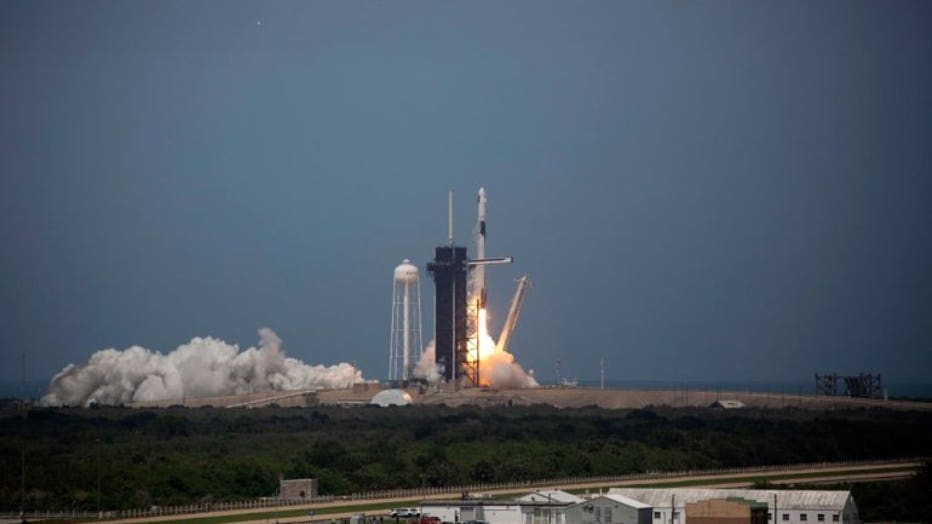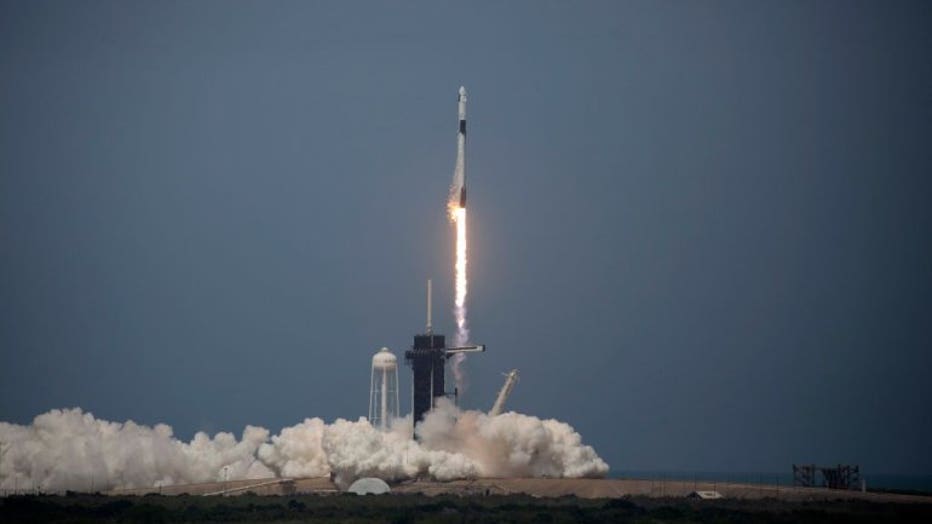'Let's light this candle:' SpaceX rocket ship lifts off with 2 Americans
CAPE CANAVERAL, Fla. — A rocket ship built by Elon Musk’s SpaceX company thundered away from Earth with two Americans on Saturday, ushering in a new era of commercial space travel and putting NASA back in the business of launching astronauts from U.S. soil for the first time in nearly a decade.
President Donald Trump and Vice President Mike Pence spoke after the launch.
NASA’s Doug Hurley and Bob Behnken rode skyward aboard a sleek, white-and-black, bullet-shaped Dragon capsule on top of a Falcon 9 rocket, lifting off from the same launch pad used to send the Apollo astronauts to the moon a half-century ago. The flight had been delayed three days because of stormy weather in Florida.
“Let's light this candle,” Hurley said, borrowing the words used by Alan Shepard on America's first human spaceflight in 1961.

The SpaceX Falcon 9 rocket launches into space with NASA astronauts Bob Behnken (R) and Doug Hurley aboard the rocket from the Kennedy Space Center on May 30, 2020 in Cape Canaveral, Florida. (Photo by Saul Martinez/Getty Images)
The two men are scheduled to arrive at the International Space Station on Sunday for a stay of up to four months, after which they will return to Earth in a Right Stuff-style splashdown at sea.
The mission unfolded amid the gloom of the coronavirus outbreak, which has killed over 100,000 Americans, and racial unrest across the U.S. over the death of George Floyd, a handcuffed black man, at the hands of Minneapolis police. NASA officials and others held out hope the flight would would be a morale-booster.
“Maybe there’s an opportunity here for America to maybe pause and look up and see a bright, shining moment of hope at what the future looks like, that the United States of America can do extraordinary things even in difficult times,” NASA Administrator Jim Bridenstine said before launch.

The SpaceX Falcon 9 rocket launches into space with NASA astronauts Bob Behnken (R) and Doug Hurley aboard the rocket from the Kennedy Space Center on May 30, 2020 in Cape Canaveral, Florida. (Photo by Saul Martinez/Getty Images)
With the on-time 3:22 p.m. liftoff, SpaceX, founded by Musk, the Tesla electric-car visionary, became the first private company to launch people toward/into orbit, a feat achieved previously by only three governments: the U.S., Russia and China.
The flight also ended a nine-year launch drought for NASA, the longest such hiatus in its history. Ever since it retired the space shuttle in 2011, NASA has relied on Russian spaceships launched from Kazakhstan to take U.S. astronauts to and from the space station.
In the intervening years, NASA outsourced the job of designing and building its next generation of spaceships to SpaceX and Boeing, awarding them $7 billion in contracts in a public-private partnership aimed at driving down costs and spurring innovation. Boeing’s spaceship, the Starliner capsule, is not expected to fly astronauts until early 2021.
Musk said earlier in the week that the project is aimed at “reigniting the dream of space and getting people fired up about the future.”
Ultimately, NASA hopes to rely in part on its commercial partners as it works to send astronauts back to the moon in the next few years, and on to Mars in the 2030s.
Before setting out for the launch pad in a gull-wing Tesla SUV — another Musk product — Behnken pantomimed a hug of his 6-year-old son, Theo, and said: “Are you going to listen to Mommy and make her life easy?” Hurley blew kisses to his 10-year-old son and wife.
Inside Kennedy Space Center, attendance was strictly limited because of the coronavirus, and the small crowd of a few thousand was a shadow of what it would have been without the threat of COVID-19. President Donald Trump and Vice President Mike Pence flew in for the event for the second time in four days.
By NASA’s count, over 3 million viewers tuned in online.
Despite NASA’s insistence that the public stay safe by staying home, spectators gathered along beaches and roads hours in advance.
Among them was Neil Wight, a machinist from Buffalo, New York, who staked out a view of the launch pad from a park in Titusville.
“It’s pretty historically significant in my book, and a lot of other people’s books. With everything that’s going on in this country right now, it’s important that we do things extraordinary in life,” Wight said. “We’ve been bombarded with doom and gloom for the last six, eight weeks, whatever it is, and this is awesome. It brings a lot of people together.”
The astronauts were kept in quasi-quarantine for more than two months before liftoff. The SpaceX technicians who helped them get into their spacesuits wore masks and gloves that made them look like black-clad ninjas. And at the launch center, the SpaceX controllers were seated far apart.
Hurley, a 53-year-old retired Marine, and Behnken, 49, an Air Force colonel, are veterans of two space shuttle flights each. Hurley piloted the space shuttle on the last launch of astronauts from Kennedy, on July 8, 2011.
In keeping with Musk’s penchant for futuristic flash, the astronauts wore angular white uniforms with black trim. Instead of the usual multitude of dials, knobs and switches, the Dragon capsule has three large touchscreens.
SpaceX has been launching cargo capsules to the space station since 2012. In preparation for Wednesday’s flight, SpaceX sent up a Dragon capsule with only a test dummy aboard last year, and it docked smoothly at the orbiting outpost on autopilot, then returned to Earth in a splashdown.
During the Mercury, Gemini, Apollo and shuttle programs, NASA relied on aerospace contractors to build spacecraft according to the agency’s designs. NASA owned and operated the ships.
Under the new, 21st-century partnership, aerospace companies design, build, own and operate the spaceships, and NASA is essentially a paying customer on a list that could eventually include non-government researchers, artists and tourists. (Tom Cruise has already expressed interest.)
“What Elon Musk has done for the American space program is he has brought vision and inspiration that we hadn’t had” since the shuttle’s retirement in 2011, Bridenstine said on the eve of launch. He called the SpaceX chief “brilliant” and said Musk has “absolutely delivered” for NASA.
The mission is technically considered by SpaceX and NASA to be a test flight. The next SpaceX voyage to the space station, set for the end of August, will have a full, four-person crew: three Americans and one Japanese.
Wednesday’s first human flight was originally targeted for around 2015. But NASA’s commercial crew program encountered bureaucratic delays and technical setbacks.
A SpaceX capsule exploded on the test stand last year. Boeing’s first Starliner capsule ended up in the wrong orbit during an crew-less test flight in December and was nearly destroyed at the mission’s end. Both companies had trouble with such things as the landing parachutes.

